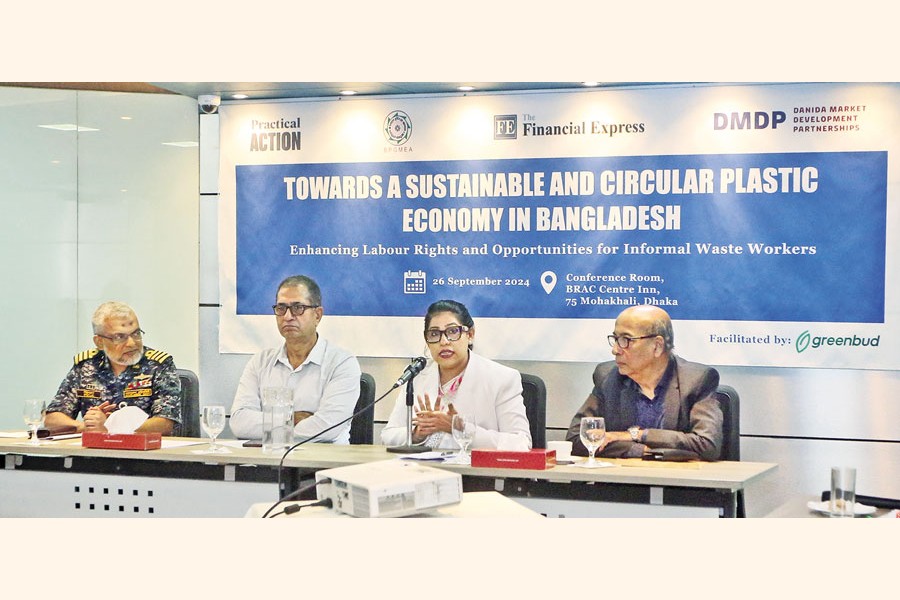
Published :
Updated :

Stakeholders on Thursday accentuated the need to ensure labour rights of and better access to finance and entrepreneurship by informal waste workers with intent to enable a sustainable circular plastic economy in Bangladesh.
They said city corporations and the local government have a major role to play in addressing those challenges to improve the recycling sector as a formal one with better working conditions and rights.
Participants portrayed a poor picture mainly due to a non-functioning waste management system in municipalities, also discussing decent jobs and labour rights for the informal waste collection and recycling sector at national level.
They were addressing a roundtable styled 'Towards a sustainable and circular plastic economy in Bangladesh: Enhancing labour rights and opportunities for informal waste workers' in Dhaka.
Practical Action Bangladesh, Bangladesh Plastic Goods Manufacturers & Exporters Association (BPGMEA) and The Financial Express (FE) co-hosted the event facilitated by Greenbud.
Practical Action interim country director Achyut Luitel delivered an address of welcome at the programme, while Capt Fida Hasan, solid waste management chief, Dhaka North City Corporation (DNCC), and BPGMEA president Shamim Ahmed were special discussants.
Mr Hasan focused on a structured waste management and recycling system, as he said the DNCC initiated a project to recycle 3,000 tonnes of solid waste to produce 42-megawatt power.
The Dhaka Power Distribution Company will purchase power and distribute it.
According to the waste manager, indiscriminate dumping of wastes onto streets is a big problem in waste management.
Banning plastic bags and products is not a viable solution, argued BPGMEA chief Shamim. "International experiences show levying charge on plastic bags brings better outcome like reduction in use."
He also laid emphasis on better financing for the recycling industry as it was yet to become an organised sector.
In a keynote presentation, Md Fariduzzaman and Sirajus Salekin of Practical Action shared their experiences on the plastic waste recycling process in Faridpur Municipal area.
Khadem Mahmud Yusuf, managing director, Bangladesh Petrochemical Company Ltd, highlighted that the recycling industry still remained an underground sector in the country.
"This sector (recycling) is yet to be recognised as a formal industry...," he said.
Furthermore, investors and entrepreneurs do not get adequate space to install recycling units they want, lamented Mr Yusuf, citing syndicate and middlemen controlling the sector.
"Complication on part of the revenue board also remains another big challenge," he uttered.
Representatives from the European Union expressed their interest in public-private investment and observed that Bangladesh could consider the waste management system, regulations and legislation from EU countries.
Discussants also pointed out the social responsibility of the companies producing plastic goods and packaging.
SM Faysal from Unilever and Debabrata Roy Chowdhury from Nestle talked about their initiatives to increase the value of recycling from consumed products and the perspective of producers' responsibility.
"Recycling cost is comparatively higher in Bangladesh than in neighbouring countries," Chowdhury said citing it as a major challenge.
Khondkar Morshed Millat, a former director of the Bangladesh Bank, said the central bank was so passionate to contribute to green financing and sustainable financing.
"There is a list of 94 products and initiatives in green categories on the website of the central bank and waste management and sanitation are also there."
There are so many policies but with a huge gap in their execution, according to Mr Millat, as he said there should be a real database, not name-only, for developing business and assessing risks.
The sector plays a pivotal role in maintaining environmental health and advancing circular economy principles, yet workers are frequently excluded from formal protection and economic opportunities.
The panel of discussants called for bridging this gap by promoting sustainable labour practices, enhancing livelihoods of informal workers and aligning waste management practices with inclusive economic development.
Practical Action country director Ishrat Shabnam summarised the discussion.
"It's a call of urgency," she said underscoring the need to save the world from plastic pollution as plastic reaches the ocean, destroying biodiversity. "We have to solve the problem (plastic) as we created the crisis."
She pointed out that multiple interactions were imperative to improve labour situation in the informal sector. "We should look at the industry from the perspective of waste management, segregation and recycling."
Tanzeen Hossain, programme head of Practical Action, moderated the event.
nsrafsanju@gmail.com


 For all latest news, follow The Financial Express Google News channel.
For all latest news, follow The Financial Express Google News channel.